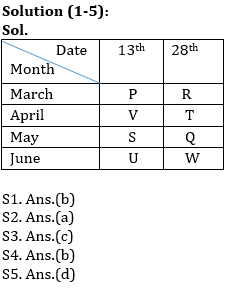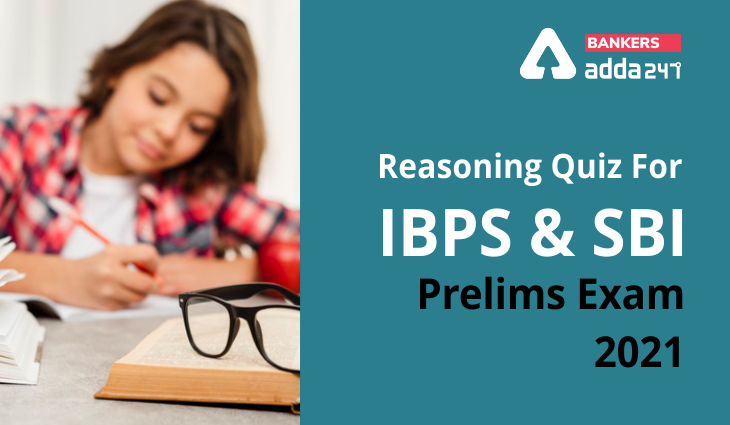Directions (1-5): Study the following information carefully to answer the given questions:
Eight Persons are going to attend seminar on two different dates-13th and 28th of the four different months starting from March to June.
Only three persons attend seminar between V and U, who goes in the month which has even number of days. More than four persons attend seminar after P. Only two persons attends seminar between P and T, who attends on an even number date. V attends seminar immediate after R, but not in the same month. Q and W attends seminar on the same date but in different month. More than one person attend seminar between S and W. U and T don’t attend seminar in same month.
Q1. Who among the following attend seminar on 28th May?
(a) T
(b) Q
(c) P
(d) S
(e) None of these
Q2. V attends seminar on which of the following month?
(a) April
(b) June
(c) March
(d) May
(e) Cannot be determine
Q3. How many persons are going in between R and Q?
(a) Two
(b) One
(c) Three
(d) More than Three
(e) None
Q4. Which of the statement is true about W?
(a) W attends seminar on an odd number date
(b) W attends seminar on the month which has even number of days
(c) Only two persons are attending seminar between T and W
(d) Q attends seminar immediate before W
(e) None of these
Q5. Four of the following are alike in a certain way so form a group, which among the following does not belong to that group?
(a) P- 13th March
(b) Q- 28th May
(c) U- 13th June
(d) V- 28th April
(e) S- 13th May
Directions (6-10): Study the following information carefully and answer the given questions.
In number arrangement machine when given an input line of numbers, it rearranges them following a particular rule in each step. The following is an illustration of input and rearrangement.
Input: 75 16 56 29 48 31 64 97 26 57
Step I: 92 75 56 48 31 64 97 26 57 17
Step II: 13 92 75 56 48 64 97 57 17 27
Step III: 75 13 92 75 56 64 97 17 27 49
Step IV: 57 75 13 92 64 97 17 27 49 57
Step V: 79 57 75 13 92 17 27 49 57 65
And step V is the last step of the arrangement.
As per the above rule followed in the above steps, find out in each of the following questions the appropriate step for the input given below;
Input: 86 12 53 22 45 19 32 29 74 93
Q6. Which of the following is the last step of above input?
(a) III
(b) VI
(c) IV
(d) V
(e) None of these
Q7. Which is the following step?
Step: 54 92 91 86 53 74 93 13 23 33
(a) VI
(b) III
(c) IV
(d) V
(e) There is no such step
Q8. What is 4th element from right end in Step IV?
(a) 13
(b) 91
(c) 86
(d) 93
(e) 54
Q9. Which of the following elements lies exactly between 91 and 32 in step II?
(a) 13
(b) 86
(c) 53
(d) 23
(e) 74
Q10. Which of the following is the fifth step for input?
(a) 39 35 54 33 75 87 92 91 13 23
(b) 39 35 33 75 87 54 92 91 13 23
(c) 39 91 13 23 33 35 54 92 75 87
(d) 39 35 23 33 54 92 91 13 75 87
(e) 39 35 54 92 91 13 23 33 75 87
Directions (11-15): Following questions are based on the five three-digit numbers given below.
792 813 541 462 692
Q11. If the positions of the second and the third digits of each of the numbers are interchanged then, how many even numbers will be formed?
(a) None
(b) One
(c) Four
(d) Three
(e) Two
Q12. If all the digits in each of the numbers are arranged in increasing order within the number then, which of the following number will become the second lowest in the new arrangement of numbers?
(a) 792
(b) 462
(c) 813
(d) 692
(e) None of these
Q13. If one is added to the second digit of each of the numbers and one is subtracted to the third digit of each number then, how many numbers thus formed will be divisible by three in new arrangement?
(a) Two
(b) One
(c) None
(d) Three
(e) Four
Q14. What will be the difference when Second digit of the 3rd lowest number is multiplied with the third digit of the highest number and third digit of the 2nd highest number is multiplied with the second digit of the lowest number?
(a) 22
(b) 27
(c) 13
(d)15
(e) None of these
Q15. If all the numbers are arranged in ascending order from left to right then, which of the following will be the sum of all the three digits of the number which is 2nd from the right in the new arrangement?
(a) 17
(b) 16
(c) 18
(d) 15
(e) None of these
Practice More Questions of Reasoning for Competitive Exams:
Reasoning for Competitive Exams |
Reasoning Ability Quiz For SBI, IBPS Prelims 2021- 24th March |
Reasoning Ability Quiz For SBI, IBPS Prelims 2021- 23rd March |
Study Plan for IBPS and SBI Exams 2021 |
Solutions

Solution (6-10):
Sol. In this input output question two numbers are arranged in each step following a certain pattern. Let us understand the logic behind it-
* Even numbers are arranged at the right end, from left to right in ascending order after adding one in each number.
* Odd numbers are arranged at the left end, from right to left in ascending order after the digits are interchanged within the number.
Input: 86 12 53 22 45 19 32 29 74 93
Step I: 91 86 53 22 45 32 29 74 93 13
Step II: 92 91 86 53 45 32 74 93 13 23
Step III: 54 92 91 86 53 74 93 13 23 33
Step IV: 35 54 92 91 86 93 13 23 33 75
Step V: 39 35 54 92 91 13 23 33 75 87
S6. Ans.(d)
S7. Ans.(b)
S8. Ans.(a)
S9. Ans.(c)
S10. Ans.(e)
S11.Ans(e)
S12.Ans(e)
S13.Ans(d)
S14.Ans(d)
S15.Ans(c)
Practice with Online Test Series for SBI and IBPS Prelims 2021:
Click Here to Register for Bank Exams 2020 Preparation Material




 GA Capsule for SBI Clerk Mains 2025, Dow...
GA Capsule for SBI Clerk Mains 2025, Dow...
 The Hindu Review October 2022: Download ...
The Hindu Review October 2022: Download ...
 Dhanlaxmi Bank Syllabus 2025, Junior Off...
Dhanlaxmi Bank Syllabus 2025, Junior Off...


